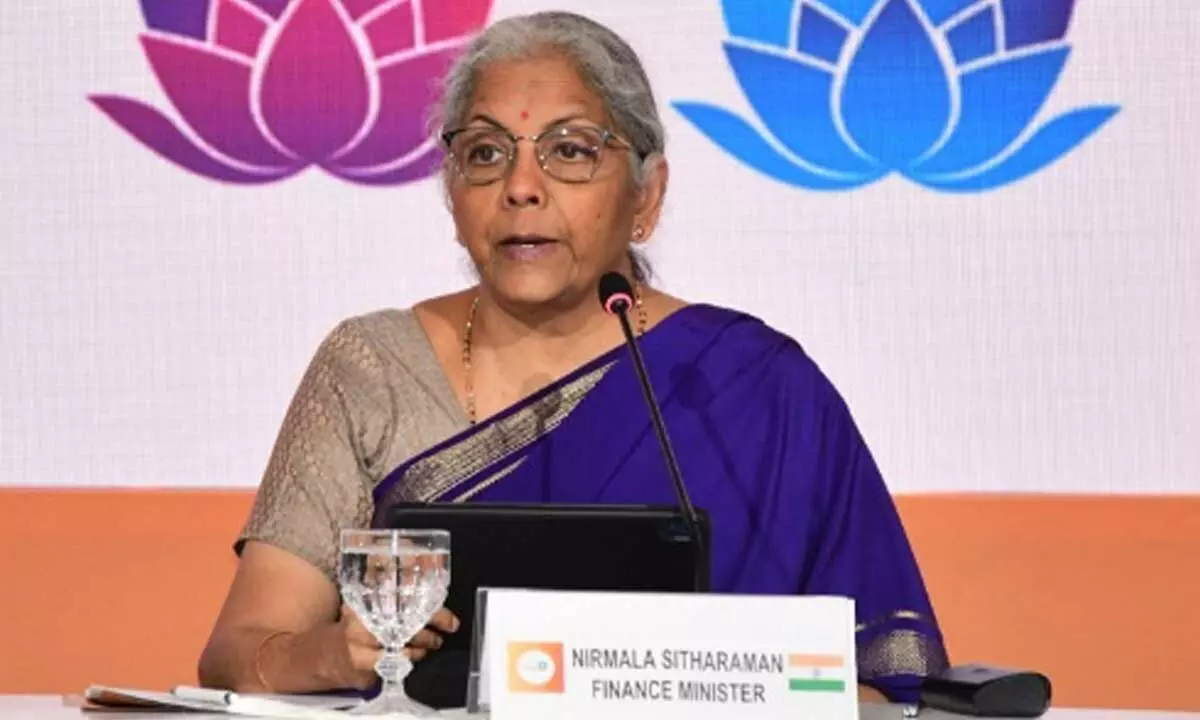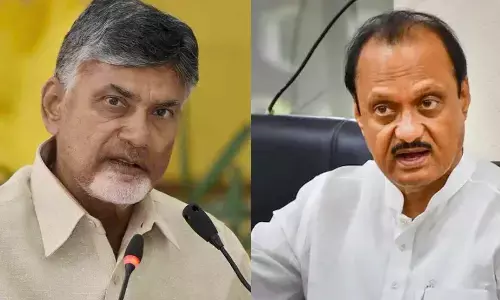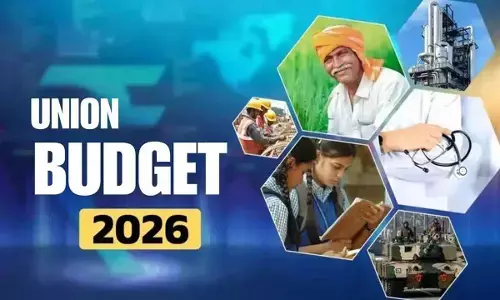Pre-Budget Expectation 2024-25: Here’s what education sector expect

Finance Minister Nirmala Sitharaman
The Union Finance Minister Nirmala Sitharaman will present the Interim Budget 2024-25 on February 1.
The Union Finance Minister Nirmala Sitharaman will present the Interim Budget 2024-25 on February 1.
Young Hans spoke with some of the education experts on, what are the expectations from the Union Budget 2024 for the Education Sector? Experts suggest that the interim budget should focus on skill development, vocational training, and infrastructure spending to boost economic growth and create employment opportunities.
Shweta Sastri, Managing Director, Canadian International School, Bangalore
In the upcoming budget, some specific areas of favourable allocation should include: expansion of infrastructure for education, investment in skill development programs, particularly in areas that align with emerging industries, expansion of scholarships and other financial aid programs for students from economically weaker sections of society, implementation of new pedagogical methods, strengthening of vocational training programs to equip students with industry-relevant skills and increased investment in research and innovation in the field of education.
Looking ahead, we must strive to ensure that the learning experience remains meaningful and enriching. Overall, it is important to nurture, challenge, and empower all students to be successful in whatever they choose in life through transformative initiatives. We expect that the upcoming budget promises adequate public investment on education to lead young India on the path of unprecedented growth.
Niru Agarwal, Trustee, Greenwood High International School
While new educational policies have identified many path-breaking initiatives, we urge the government to focus on expanding access to education and technology, particularly in rural and underserved areas. We have to build the right combination of Digital, Physical and on-the-job classrooms infrastructure that will improve the efficacy of learning. We also need to create an enabling environment to let the private sector come forward and establish new institutions. Ease of doing business is more important here than anywhere else.
There is also need to advocate gender-focused allocation to promote womens’ education. The country is in need of expertise at different levels and this demand can be met only by training students at the school level. The foundation and vision set by the government, through NEP will be vital in achieving the goal of an effective and inclusive education system. However, the future of Indian education will be marked by innovation, inclusivity, and a commitment to prepare students to face challenges and opportunities that lie ahead. Overall, we hope that the budget gives a much-needed boost to the education sector to cope up with varied tasks in the current context.
Prateek N Kumar,Founder and CEO - NeoNiche Integrated Solutions ltd
As a business leader eagerly anticipating the Indian Finance Budget 2024, my expectations extend to key reforms that encompass the agricultural sector. I anticipate measures aimed at revitalising the agrarian economy, with a focus on sustainable practices, technological innovation, and improved infrastructure for rural areas. Inclusion of comprehensive policies for the agricultural sector will not only uplift farmers but also contribute significantly to overall economic growth.
I hope to see initiatives that address the challenges faced by farmers, including access to credit, modern farming techniques, and market linkages. Implementing sustainable agricultural practices aligns with global trends and positions India as a responsible player in the global market.
Moreover, investments in rural healthcare and education are pivotal for creating a robust and skilled agricultural workforce. Streamlining regulatory processes in the agricultural domain, coupled with initiatives to enhance ease of doing agribusiness, will foster entrepreneurship and job creation in rural areas. A well-rounded budget, encompassing agriculture, will lay the foundation for a resilient, inclusive, and vibrant business ecosystem in India.
Balu Ramachandran - Founder, CEO OC Academy
As we approach the upcoming budget, I strongly advocate prioritising significant investments in the education sector, especially tailored for the unique needs of medical professionals. Allocating funds for technology integration, skill development, and creating a supportive learning environment will elevate medical education quality and enhance healthcare delivery. The use of online tech enabled education to supplement physical classes will go a long way in increasing the availability of skilled medical professionals to solve the country's healthcare challenges. These strategic allocations will empower our healthcare professionals to thrive in their careers, positively impacting the healthcare landscape
Jitendra Karsan, Chairman, Safari Kid
Anticipating Budget 2024-25, our aspirations align with the visionary ethos of NEP 2020, envisioning a budget that lays the foundation for an education realm strengthened by a progressive curriculum. We seek a curriculum that not only imparts knowledge but also fosters critical thinking, innovation, and real-world skills crucial for the future. Simultaneously, our expectations extend to a budget that propels digital enhancement across all educational boards and levels. Recognising the pivotal role of technology, we advocate for an inclusive and dynamic learning environment, ensuring every student is adequately prepared for the challenges presented by the digital era.
Allocating resources to education is vital to bridge gaps, improve access, and boost overall quality. Recognising its importance, the education sector should also open up to the private sector either through public private partnerships or otherwise, for faster penetration of quality education in both urban and rural areas. Additionally, there's a push for the recruitment and retention of qualified teachers, competitive remuneration, and professional development. Envisioning a future where education is a catalyst for personal growth and national progress, Budget 2024-25 holds the key to shaping this transformative journey by addressing these critical aspects.
Rekha Kejriwal, Academic Director of Academy of Fashion & Art (AFA)
As we await the upcoming budget, it becomes important to strike a careful balance between in-school and after-school learning, harnessing the advantages of technology. A comprehensive strategy to address challenges related to access, equity, and education quality is needed. There is a need to emphasize enhancing the digital capabilities of schools and promoting a supportive environment for asynchronous learning at home. This dual focus is important to ensure a well-rounded educational experience for all.
Furthermore, it is important to align these efforts with evolving educational needs and incorporate innovative solutions. This includes investing in teacher training programs to effectively integrate technology into classrooms and providing support for students who may face challenges in accessing digital resources by announcing scholarships for meritorious students at the school and college levels. The budget's commitment towards these aspects will contribute significantly to the overall improvement of our education system.
Nidheesh Saxena, Senior Director of Admissions, Gitam Deemed to be University
Union Budget 2024 is expected to play a crucial role in sculpting a tax framework that supports educational advancements, addresses financial challenges for students, and contributes to the goal of achieving a higher GER, ultimately fostering economic growth through a well-educated and skilled workforce. He stresses the need for comprehensive teacher training programs, ensuring educators are equipped with the necessary skills to leverage modern tools effectively. All eyes are on India for the economic growth that is expected to scale the foreign investments in the country. Allocating resources to education is highlighted as an investment in the minds and aspirations of the nation's youth.
Dr Chef Balendra Singh, Director Institute of Bakery and Culinary Arts
As we eagerly anticipate the upcoming budget, the hospitality sector, a cornerstone of our country's economic and cultural identity, has faced unprecedented challenges in recent times. We sincerely hope that the government recognizes the pivotal role our industry plays in driving tourism and creating employment opportunities.
A judicious allocation of funds toward skill development programs, technological advancements, and enhancement of infrastructure for hospitality education is paramount. This will empower our institute and other institutions to produce industry-ready professionals and foster innovation and global competitiveness.
Furthermore, we encourage the government to consider incentivizing collaborations between academia and the hospitality sector for research and experiential learning initiatives. This synergistic approach can elevate the quality of education and address the evolving needs of the industry.
Dr Prof Anand Achari, Principal, Vivekanand Education Society’s College of Architecture
The government's efforts in implementing skill development programs have set the stage for positive change. However, there is a need to strengthen industry-academia collaboration for better alignment of academic curricula with the evolving job market. Moreover, prioritizing financial support for Academic-Industry Collaboration is crucial, as it serves to forge robust connections between educational institutions and industries. This strategic emphasis ensures that academic curricula stay abreast of the ever-evolving demands of the industry, thereby nurturing a workforce equipped with agility, adaptability, and preparedness for future challenges.
As we navigate the complexities of our changing educational landscape, let's consider this budget as an opportunity for a positive shift in the education sector – one that emphasizes not only skill development but also the holistic growth of individuals prepared for the contemporary workforce.
In addition to supporting infrastructure grants, the incorporation of technology-based learning can contribute to a more balanced and future-ready education system.
Dr Dhara Thakore, Head Incubation and Office of Career Service, Anant National University
If India fulfills the providing of 25% per cent of the global workforce by 2047, access to world-class education is essential. The NEP 2020 also emphasises a multidisciplinary and holistic approach. With the emergence of new-age technologies, there is a significant shift in the preference of students from traditional to creative industries such as design, fashion, literature, gaming etc. Creating a conducive environment for the growth of this sector will require an amalgamation of various learning dimensions like research, innovation, skill development and entrepreneurship.
Prioritising budgetary allocation and policy-level support is anticipated from the Interim Budget to boost infrastructure, research, and protect intellectual property and experiential learning in this sector, particularly for private higher educational institutions. Another favourable area for allocation could be the academic startup ecosystem to convert nascent ideas into groundbreaking business ventures which in turn will boost the economy of the nation.
Dr Jitin Chadha, Founder & CEO, Indian Institute of Art & Design
While last year's budget rightfully emphasised green growth and sustainability, this year presents a unique opportunity to invest in our most valuable asset—human capital. Specifically, focusing on nurturing the talent and innovative spirit of the Indian youth will be instrumental in driving our digital economy forward
Some aspects within design education require particular attention in the upcoming budget. One critical aspect is the imperative to boost the Research and Development (R&D) sector in tandem with strategic investments in infrastructure. Allocating the budget for co-funded research projects between design institutes and private companies, leveraging industry expertise, will be paramount. Providing direct grants to expand and equip design labs with cutting-edge tools and technologies will facilitate deeper exploration and innovation.
A global perspective is essential, and the "Study in India" initiative by the Ministry of Education offers immense potential to attract international students to our world-class design institutes. The budget could play a crucial role by allocating resources to promote this programme through targeted campaigns, providing scholarships for foreign students pursuing design courses in India and promoting cultural exchange programmes centred around design thinking. This not only enriches the learning environment for students but also projects India's design landscape onto the global stage."
Dinesh Kumar Poobalan, CEO & CTO, Greatify
Various reforms and policies have been implemented every year, favouring the education system. However, we expect a more robust system to be developed, investing in professional development and training opportunities to help us effectively implement blended learning methods in the classroom and utilize technology-enabled infrastructure. We also expect a decrease in Goods and Services Tax on resources for offline and online education providers.
The education system also needs to be modernized to attract more international students. This will require substantial investments in the education system, particularly emphasizing higher education. As per the data, higher education investment will also help improve the gross enrolment ratio (GER), which is set to reach 50% by 2035.
Ankit Agrawal, CEO and Co-Founder Insurance Dekho
In the interim budget, we want the government to support the startup ecosystem by further easing the ease of doing business. While it’s easy to start a business in India today, it is paramount to ensure that it strives and thrives. The majority of startups fail, and hence it’s equally important to not only ease starting up but also make it easier for entrepreneurs to move on in case they are not able to establish a market-fit product. While the government is taking initiatives to promote entrepreneurship in India, we request that the government set aside more funds, provide access to newer technologies, ease tax rules, and further simplify regulatory requirements to encourage people to start their businesses.
Anthony Fernandes, Founder Shaalaa.com.
Teachers play an important role in the education landscape, making teacher training a critical aspect. Allocating a dedicated budget for teacher training is essential. A proficiently trained teacher excels in effective communication, enhancing students' understanding and enabling the teacher to cover more material within the same timeframe. Additionally, prioritising upskilling is of utmost importance, as it not only contributes to a teacher's professional growth but also enhances students'
Devyani Jaipuria, Pro-Vice Chairperson DPS International, DPS Gurgaon, DPS Jaipur, Chairperson - Dharav High School, Jaipur
"Our primary focus should be on ensuring access to education for all. By making it economically accessible, we are addressing the need of the hour for affordable education and fostering nationwide growth. It is crucial to prioritize affordability in education by implementing tax reductions and reducing costs. This becomes even more critical given that nearly half of India's population is under 25. Lowering the financial barriers to education not only benefits students economically but also contributes to the development of a highly skilled workforce.
We need to allocate funds towards establishing AR/VR labs and Robotics facilities in schools, enhancing the learning experience through technology. The budget should actively support digital education initiatives by offering tax incentives and forming partnerships with tech companies to improve online learning platforms. To foster a future-ready workforce, there is a need to integrate subjects like analytics into the school curriculum, ensuring that students are equipped with essential skills early on, aligning with the evolving demands of the digital age. Remote learning has emerged as a powerful tool, democratizing education by breaking down geographical barriers and providing access to quality learning experiences for students, irrespective of their location.
Therefore, the 2024 education budget should reflect our dedication to innovation, collaboration, and preparing the next generation for the challenges of the future as well as taking a step towards building a more egalitarian society."
Sachin Jain, Country Manager, ETS India & South Asia
“As we look ahead to the upcoming budget for 2024, ETS urges policymakers to allocate resources that accelerate global mobility of India’s young talent. This includes inclusion of language skills and internationally recognized work skill certifications in Indian classrooms. Skills development enterprises, both public and private, must leverage globally benchmarked and recognised skills framework and certifications as these are valued by employers internationally.”
Policy makers should also look at a comprehensive merit scholarship program for deserving Indian students for postgraduate and research studies in foreign universities with an aim to drive research and innovation in India post completion of their studies. We also urge policymakers to advance public private partnership models that accentuate the “Study in India” initiative, which aims to reinforce India’s position as a Vishwa-Guru to the world.
Saurabh Arora, CEO, University Living
In anticipation of the upcoming budget, we at University Living want to draw the government’s attention to essential measures that can profoundly impact Indian students pursuing education abroad. We feel an increase in the fund allocation especially to the higher education sector will be welcomed by the expanding student community in India.
Foremost, we believe lower interest rates on education loans will be a crucial step in alleviating financial burdens for students and their families, enhancing access to education in a destination of one’s choice.
Further, there is a critical need for an increase in grants and scholarships for Indian students, providing essential financial support to deserving students. Scholarships play a transformative role, offering support and opportunities for talented students facing financial constraints, to successfully pursue their academic journey.
Additionally, a reduction or waiver in Tax Collected at Source (TCS) while remitting money for overseas education and ancillary activities will be a welcome sign. Lowering or waiving off TCS while remitting funds overseas for education will ease the burden on families and encourage more students to explore educational opportunities at a destination of their choice.
Lastly, exploring student concessions on air travel is imperative to make global education economically viable for a broader demographic of students, fostering cultural exchange and elevating India's representation on the global academic stage.
In summary, we hope these comprehensive budgetary considerations aim to create a more supportive environment for Indian students undertaking international education, fostering academic growth, and contributing to India's global educational standing.
Manisha Zaveri, Joint Managing Director, Career Mosaic
“We are anticipating the upcoming budget's potential to unlock new opportunities for international student mobility, we are optimistic about the potential of initiatives fostering collaboration between Indian and international universities, creating avenues for cross-cultural learning and research opportunities. A budget that prioritizes global education will not only empower the vibrant minds of young Indians but also solidify India's standing in STEM fields.
With the Indian study abroad sector poised for a post-pandemic resurgence, the upcoming budget holds immense significance. We expect the government to recognize and harness this potential by implementing measures to make international education more accessible and affordable. This could involve targeted scholarship schemes for Tier 2 and Tier 3 city students, tax benefits for families supporting overseas education, and streamlined visa processes. A supportive budget addressing these aspects will not only enable students to pursue their international education dreams but also contribute significantly to India's long-term economic and intellectual growth.”
Anish Srikrishna, CEO, TimesPro
“Last year’s Union Budget reflected the government's commitment to nurturing skilled professionals amidst dynamic changes. To propel our education system to the next level and achieve 100% digital literacy, I propose the implementation of crucial measures. Firstly, fostering collaboration between the proposed National Digital University and EdTech entities is pivotal. By jointly offering programmes, certifications, and employment opportunities, we can efficiently upskill a broader Indian population. The incentivisation of such initiatives through tax rebates for EdTech companies will ensure affordability for learners, fostering widespread adoption of technology-led education. Moreover, increasing public-private partnerships and incentivising the creation of future-centric courses will empower Indian youth for the job market. The reduction of GST on online learning courses and lowering education loan interest rates will make education more accessible, especially in Tier II & III regions. The digital divide is paramount, hence, there should be an increase in infrastructure allocations to improve rural internet connectivity, and tax relief for students acquiring digital devices will ensure universal access to online education, regardless of geographic constraints. Lastly, earmarking funds for continuous tech development and establishing a regulatory framework are indispensable for sectoral growth. These initiatives will not only create stability and attract investments but also stimulate innovation, foster entrepreneurship, and ensure the long-term sustainability of our EdTech sector.”
Vishnu Manchu, Chief Executive Officer, Sree Vidyanikethan Educational Trust
"Anticipating the Union Budget 2024, we are optimistic about a transformative fiscal policy addressing key nation-building pillars, aligning with the objectives outlined in the National Education Policy (NEP). We expect the government to bring about a crucial shift from subject-based to skill-based learning, placing a particular emphasis on mathematics, computer science, and data science. Additionally, creating a robust research ecosystem is equally vital, necessitating provisions for funding research students to catalyse path-breaking innovation.
Recognizing the gender gap in educational attainments, we call for additional funding and schemes to ensure gender parity in education, contributing to the inclusive vision of 'Amritkaal.' To bolster tertiary education enrollment, we anticipate allocating funds for attractive loan schemes and scholarships, aligning with the NEP's emphasis on accessible and quality higher education.
Our expectations extend towards initiatives fostering innovation, skill education, job creation, and social welfare, recognizing their interconnected role in shaping a resilient and prosperous nation. A well-crafted education budget can act as a catalyst for empowering future generations, fostering research and development, and bridging socio-economic gaps. Our sincere hope is that the Union Budget 2024 reflects a steadfast commitment to nurturing a knowledge-driven society, laying the groundwork for a brighter and more equitable future for all citizens."
Ravi Sonnad, Founder and CEO, Enabling Leadership
India is now the fastest growing large economy and is well on its way to becoming the fourth largest economy in the world. One of the biggest advantages that India has today is its young population – more than 50% of the country is less than 25 years old. If this group can be well educated, resulting in a large and talented workforce, the country would reap enormous benefits – what economists call a “demographic dividend.” The NEP, which was formulated in 2020 and was passed as a resolution in the parliament in 2023 is a very strong starting point towards this goal. However, with almost 1 in 4 school going children of the world in India and 60% of them in government schools, this journey is a massive endeavour that requires intensive collaboration between the government, the corporate sector, and NGOs. With the Union Budget 2024 just around the corner, it is a great opportunity for India to foster an environment of strategic collaboration between corporate houses and the NGOs operating in the education sector. The NEP has rightfully emphasized the need for a more holistic education with a special focus on socio-emotional learning. It has also made the access and opportunity to activities such as team sports, the arts and play-based learning a major priority. It is the appropriate time to ensure that the CSR guidelines are aligned with these priority areas.
This would mean emphasizing holistic education and play-based socio-emotional learning and making this a top priority area in the CSR guidelines. This would ensure that the initiatives undertaken by CSR departments and the CSR budget outlays of companies can be channelled towards the objective of developing a vibrant and dynamic educational environment for the roughly 220 million school going children, preparing them to become productive and responsible citizens of tomorrow. Another key investment area where the government can collaborate with the Corporate Sector and NGOs is a heavier focus on rural areas. Today, 60% of the population lives in India’s villages, and if the country is to capitalize on the demographic dividend, it will be essential for policy guidelines to move both funding and efforts towards building these 21st century skills in rural youth. By allocating greater resources, we can build a more inclusive, educated, and skilled India, ensuring that the workforce of tomorrow is truly future ready.
Anil Somani, Chairman of FOSTIIMA Business School-Delhi
With the 2024 Union Budget coming near, we expect the government to champion the integration of AI in education, aligning with the visionary NEP (National Education Policy) of 2020. While the NEP's commitment to allocating 6% of GDP to education is commendable, the true educational metamorphosis lies in harnessing the power of AI. It has the potential to revolutionize learning and ensure inclusivity and effectiveness through personalized approaches.”
“We further expect the government to direct strategic funding towards AI-driven educational models, digital infrastructure and promoting AI literacy. We firmly believe that these steps will not only bolster India's standing in the international education landscape but will also encourage a diverse and enriching learning experience for our students. Let the 2024 budget be a catalyst for a progressive and technology-driven era in Indian higher education.
Akash Sharma, Director of Admission and Outreach at Noida International University
The education sector is excitedly awaiting transformative measures that promote its growth and development in the 2024 budget. Nirmala Sitharaman, finance minister provided 1.12 lakh crores of funding for education in the 2023 budget, which improved and reinvented the educational infrastructure while also preparing young people for highly skilled careers.”
“Budget expectations will be higher in 2024 since it will support the Educational Gaps, which should be noticed as a model for developing nations. We are at the point of development, and the pre-budget atmosphere aligns with our shared aspirations of improved financing, innovative policies, and well-timed educational expenditures. The quotation captures this sentiment, expressing anticipation for a budget that respects education's essential function in promoting nation-building. It emphasizes how much money is required to close infrastructural gaps, improve teacher preparation programs, and adopt new technology.”
The education community anticipates a forward-thinking budget that not only solves current issues but also establishes the framework for an education system that is prepared for the future. With everyone anticipating the financial provisions to be unveiled, there is hope that the government will reaffirm its commitment to promoting a knowledge-driven society by implementing ambitious and innovative education-related projects.
Archana Surana, Director and Founder of ARCH College of Design and Business
For a flourishing creative economy, We believe the government should prioritize the establishment of a National Design Research Fund in the upcoming Union Budget 2024 considering that it is the fastest-growing sector in terms of job opportunities & enterprise development. This crucial initiative would provide essential support for the development of innovative design technologies and methods, alongside developing top talent to address the uncertainties of the future. To ensure comprehensive development, it is imperative for every state to formulate its own Design Policy framework and set up a Design & Innovation Board to address the local needs of both the organized and unorganized sector. Establishing a dedicated Design Board in each state to drive research and innovation through design intervention will contribute significantly to the design education at the grassroots level and uplift the local industries.
Furthermore, the education ministry should take proactive measures to address the shortage of qualified faculty members in design education, implementing strategies for robust design faculty development. This step is pivotal in overcoming the most significant challenge currently facing the design education sector in India. Incentivizing collaboration between companies and design institutions through a CSR-like tax incentive would be a strategic move. This incentive would not only benefit companies but also encourage design students to actively engage with industry partners, thereby enhancing their exposure and employability.














